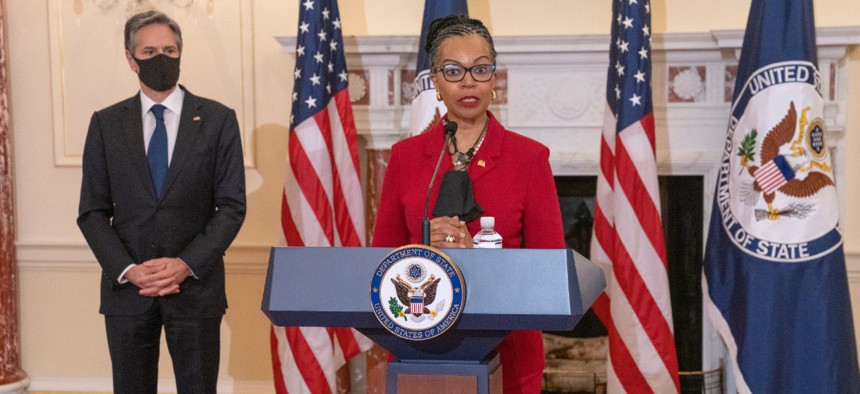
With Secretary of State Antony Blinken looking on, Amb. Gina Abercrombie-Winstanley, chief diversity and inclusion officer, delivers remarks at the State Department on April 12. Freddie Everett / State Department
New State Department Diversity Officer Met with Praise
Amb. Gina Abercrombie-Winstanley will hold the newly created position.
The appointment of a veteran diplomat to be the first Chief Diversity and Inclusion Officer at the State Department earlier this week met with a warm reception as the department has had mixed success at improving diversity in its workforce.
On Monday, Secretary of State Antony Blinken announced that Amb. Gina Abercrombie-Winstanley, who joined the Foreign Service in 1985 and has 30 years of diplomatic experience, would hold the new position. The Government Accountability Office reported last year that from fiscal 2002 to 2018 there was “uneven progress” in strengthening diversity at the State Department.
“From Me Too, to Black Lives Matter, to the recent attacks on Asian Americans, we’re grappling with the profound ways that race, gender, and other parts of our identity have so often been grounds for discrimination, dehumanization, and violence – for treating people as ‘less-than,’ ” said Blinken during his remarks. “The State Department has to reckon with this too – and foster within our building the kind of inclusive environment that we’re fighting out – that we’re fighting for out in the world.”
He added, “this problem is as old as the department itself” and “goes much deeper than any one institution or any one administration – and it’s perpetuated by policies, practices and people to this day.”
Specifically, Abercrombie-Winstanley will establish a framework to bolster diversity and inclusion in the workforce, align diversity efforts across the department and help to finalize and implement a departmentwide “Diversity and Inclusion Strategic Plan,” said the secretary. He stressed that she will hold the department accountable for making improvements.
When Blinken first announced the creation of the position in February, he also asked each bureau to designate a deputy assistant secretary to serve on a new Diversity and Inclusion Leadership Council.
“With our focus now on identifying and implementing the structural changes necessary to bring it about, we will ensure that the Department of State becomes the organization that deserves the devotion, the sacrifice and the dedication that so many of us have freely given,” said Abercrombie-Winstanley.
Many expressed their excitement about Abercrombie-Winstanley being appointed to the position and what she will do.
Laura Kennedy, a retired career diplomat, tweeted, “I’ve seen her work for years to highlight this issue,” as she is a former State Department and Leadership Council for Women in National Security colleague. This is “a great pick” by Blinken. “We can [and] must do better.”
FP 21, a nonpartisan think tank focused on transforming U.S. foreign policy processes and institutions, said in a statement on Friday it “look[s] forward to hearing more in the coming months, including the appointments for an inclusion/diversity council and the [Deputy Assistant Secretary] point-people named in each bureau.” The group noted that advocates, including FP21, have “touted the importance of transparent data and accountability, a focus on retention and promotion, and structural incentives in advancing research-backed, proven-effective, and lasting change for diversity.”
The 25 Year Apprenticeship, an initiative that provides career guidance for aspiring diplomats, and glifaa (Gays and Lesbians in Foreign Affairs Agencies), a nonprofit dedicated to advancing equity and diversity in the foreign affairs agencies and promoting LGBT human rights around the world, also welcomed the appointment.
GAO found that the total proportion of racial and ethnic minorities in full-time, permanent State Department positions increased from 28% in fiscal 2002 to 32% in fiscal 2018 with variations among specific races and ethnicities. During the same period, the number of women at the department decreased slightly from 44% in 2002 to 43% in 2018. Also, with a few exceptions, whites and men had the highest promotion rates and held the majority of leadership positions among the career service and Foreign Service.
More recently, in the wake of the murder of six Asian American women in Atlanta and other acts of violence against Asian Americans, Politico reported last month that many Asian Americans in the Foreign Service feel they are subject to “assignment restrictions” due to concerns they will be perceived as disloyal or susceptible to foreign influence in certain countries.
During his speech, Blinken said that several weeks ago he received a letter from State Department employee organizations, 17 affinity groups, and individual Civil and Foreign Service employees offering recommendations about improving recruitment and retention of diverse talent.
“They did it because they want to be part of a department where everyone is treated with respect, regardless of who they are,” he said. “And because they know this will make us stronger. Our country is so fortunate to have public servants like these.”







